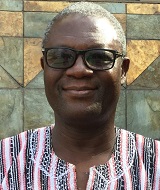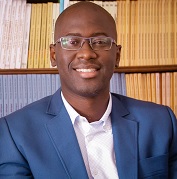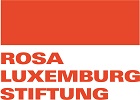You are here
- Home
- OU Economics & the Rosa Luxemburg Foundation: Book Launch: Imperialism and the Political Economy of Global South’s Debt
OU Economics & the Rosa Luxemburg Foundation: Book Launch: Imperialism and the Political Economy of Global South’s Debt
- Dates
- Tuesday, April 18, 2023 - 13:00 to 16:15
- Location
- Online via Zoom. Simultaneous translation English/Spanish/French at local time 13.00 - 16:15 (London) | 12:00 - 15:15 (Dakar) | 9:00 - 12:15 (Buenos Aires)
Watch the full recording
On 18 April 2023, the Open University jointly with the Rosa Luxemburg Foundation hosted the Book Launch of ‘Imperialism and the Political Economy of Global South's Debt’, a volume edited by Ndongo Samba Sylla. A range of chapter contributors shared their insights with the audience (see time stamps below). The session was chaired by Paul Zarembka (State University of New York at Buffalo).
Session 1: Diagnosis
4.22-15.20: Juan E. Santarcángelo (Universidad Nacional de Quilmes)
15.40-24.40: Mariano Féliz (CONICET, Argentina)
25.20-37.25: Harry Cross (Fahd University in Dhahran, Saudi Arabia)
38.30-50.35: Ndongo S. Sylla (Rosa Luxemburg Foundation, Senegal)
50.40-1.06.00: Charles Abugre (Executive Director of IDEAs)
1.07.00-1.22.50: Open discussion
Session 2: Ways forward: policy options and their feasibility
1.23.35-1.37.05: Basil Oberholzer (Global Green Growth Institute)
1.37.30-1.41.40: Introduction Rosa Luxemburg Foundation
1.42.10-1.56.05: Christina Laskaridis (Open University, London)
1.56.35-2.10.55: Olufunmilayo Arewa (Temple University, Philadelphia)
2.11.05-2.24.30: James Gathii (Loyola University Chicago)
2.25.03-2.36.25: Karina Patricio Ferreira Lima (University of Leeds)
2.36.25-3.02.40: Open discussion
Abstract
The Covid-19 pandemic has brought the issue of the Global South's debt back into the spotlight. With declining export earnings and tax revenues, many countries in Africa, Latin America and Asia have found themselves unable to service their foreign currency debt. This situation, reminiscent of the international debt crisis of the 1980s and 1990s, is the backdrop of new book edited by Ndongo Samba Sylla.
The Rosa Luxemburg Foundation and OU Economics are delighted to host the Book Launch of Imperialism and the Political Economy of Global South's Debt, where experts connect the history of this issue with a range of factors including class dynamics, the changing landscape of sovereign debt markets, the global liquidity cycle, the enduring constraints of commodity dependence, ecological sustainability and the limitations of the current ad hoc sovereign debt restructuring procedures. In contrast to orthodox accounts that view debt crises in the Global South as a cyclical problem or as consequences of 'mismanagement' or 'fiscal irresponsibility'. Imperialism and the Political Economy of Global South's Debt recognises the systemic nature of the Global South's external debt, revealed only further by the economic uncertainty of the Covid-19 pandemic, as well as the need to analyse it in relation to existing imperialist structures.
13:00 – 14:30 (BST): Session 1: Diagnosis
Chair: Paul Zarembka, Professor of Economics (State University of New York at Buffalo)
Discussant: Charles Abugre, Ghanaian economist, Executive Director of IDEAs
Speakers: Juan E. Santarcángelo (Universidad Nacional de Quilmes); Mariano Féliz (CONICET, Argentina); Harry Cross (Fahd University in Dhahran, Saudi Arabia); Ndongo S. Sylla (Rosa Luxemburg Foundation, Senegal).
14:45 – 16:15 (BST): Session 2: Ways forward: policy options and their feasibility
Chair: Paul Zarembka, Professor of Economics (State University of New York at Buffalo)
Discussant: Karina Patricio Ferreira Lima ( University of Leeds)
Speakers: Basil Oberholzer (Global Green Growth Institute); Christina Laskaridis (Open University, London); Olufunmilayo Arewa (Temple University, Philadelphia); James Gathii (Loyola University Chicago)
Speakers:
13:00 – 14:30: Session 1: Diagnosis

Paul Zarembka
Paul Zarembka has been since 1977 General Editor of Research in Political Economy (Emerald), an annual series. He earned a doctorate in Economics at the University of Wisconsin at Madison and was on the faculty at the University of California at Berkeley before joining the State University of New York at Buffalo, becoming in 1976 full professor. In 1979, he was a Fulbright scholar in Poznan, Poland where he met his wife. He published Toward a Theory of Economic Development, edited Frontiers in Econometrics and co-edited Essays in Modern Capital Theory before moving out of mainstream economics into Marxist political economy. Along with numerous articles and scholarly presentations, in 2006 he edited The Hidden History of 9-11 (updated, Seven Stories Press, 2008). Recently, he published Key Elements of Social Theory Revolutionized by Marx (Brill hardcover, Haymarket softcover, 2021).

Charles Abugre
Charles Abugre is the Executive Director for the International Development Economics Associates – a network of global south-led progressive economists and other social scientists. A Ghanaian by nationality, Charles is a development economist. Formerly a senior official of UNDP, Charles is a regular contributor to the flagship publications of the United Nations Economic Commission for Africa (UNECA) and others. His areas of interest include debt and development financing, public finance and illicit financial flows.

Juan E. Santarcángelo
Juan E. Santarcángelo holds a Ph.D. in economics (New School University, USA), Chair of the Center for Development, Innovation and Political Economy (CEDIEP) and Chair of the PhD. in Economic Development, Researcher of the National Council of Scientific and Technical Research (CONICET), and Full Professor of the Universidad Nacional de Quilmes (UNQ, Buenos Aires, Argentina). He is Editor of the Palgrave Studies in Latin American Heterodox Economics Series, Palgrave Macmillian (NY, USA).

Mariano Feliz
Mariano Feliz holds a BA in Economics (UNLP), an MA in Economic Sociology (UNSAM), a PhD in Economics (Paris XIII/Nord) and a PhD in Social Sciences (UBA). F ́eliz is Professor at UNLP, Researcher from CONICET at the Centro de Investigaciones Geogr ́aficas of the Instituto de Investigaciones en Humanidades y Ciencias Sociales (CIG-IdIHCS) of CONICET and UNLP, Member of the DECkNO (Centre for Decolonising Knowledge in Teaching, Research and Practice; University of Bath), and Fellow of the International Research Group on Authoritarianism and Counter-Strategies (IRGAC) of the Rosa Luxemburg Stiftung. He is part of the Work Group “Cuerpo, territorio y feminismo” of CLACSO, and is an activist of the research/action collective Al Borde (construyendo pensamiento indisciplinado). He works on themes related to Marxian dependency theory, critique of development, and social movements

Harry Cross
Harry Cross is an Assistant Professor at Prince Mohammad bin Fahd University in Dhahran, Saudi Arabia. He specialises in the politics and economics of Sudan after independence. His current research examines economic and financial policy since the country's revolution and political transition in 2019.

Ndongo Samba Sylla
Ndongo Samba Sylla (PhD) is a Senegalese Development Economist. He is currently a Senior Research and Program Manager at the West Africa office of the Rosa Luxemburg Foundation (Dakar). He authored The Fair Trade Scandal. Marketing Poverty to Benefit the Rich (Pluto Press & Ohio University Press 2014) and co-authored Africa’s Last Colonial Currency. The CFA Franc Story (Pluto Press 2021). He is an editor of Economic and Monetary Sovereignty for 21st century Africa (Pluto Press 2021) and of Imperialism and the Political Economy of Global South’s Debt (Edward Elgar 2023). He tweets at @nssylla.
14:45 – 16:15: Session 2: Ways forward: policy options and their feasibility

Karina Patricio Ferreira Lima
Dr. Karina Patricio Ferreira Lima is a Lecturer in Commercial Law at the University of Leeds. Inspired by the LPE movement, legal institutionalism and heterodox economics, her research is driven towards transforming the global economy through institutional innovation. Her doctoral thesis builds the political economy foundations of international sovereign bankruptcy law.

Basil Oberholzer
Basil Oberholzer received his Ph.D. from the University of Fribourg, Switzerland, and is currently an associated researcher at the Centre for Development and Environment at the University of Bern, Switzerland. His research focus is on monetary economics, development macroeconomics and ecological economics. Moreover, Basil is an economic officer at the Global Green Growth Institute, which supports governments and other stakeholders in developing countries regarding decarbonization strategies and green economic policies. His main publications include the books “Monetary Policy and Crude Oil: Prices, Production and Consumption” as well as “Development Macroeconomics: Alternative Strategies for Growth” at Edward Elgar Publishing.

Christina Laskaridis
Christina Laskaridis is Lecturer in Economics at the Open University Economics Department and Fellow of St Edmund Hall at the University of Oxford. She works on the political economy of sovereign debt and international organizations. Her thesis on ‘Debt sustainability: towards a history of theory, policy and measurement’ received the 2022 Joseph Dorfman Best Dissertation prize by the History of Economics Society. She is leading a grant on Environment-related financial risks and regulatory capital requirements funded by INSPIRE. Christina has worked with several organizations on debt-related issues, such as the OHCHR’s Independent Expert on foreign debt and human rights, UNCTAD, and several civil society organisations.

Olufunmilayo (“Funmi”) Arewa
Olufunmilayo (“Funmi”) Arewa is the Shusterman Professor of Business and Transactional Law at Temple University Beasley School of Law. Her research focuses on music, business law, entrepreneurship, technology, copyright, film, comparative law, and Africana studies. Prior to becoming a law professor, Professor Arewa practiced law in the entrepreneurial and technology startup arena. She was also Visiting Lecturer at the Center for Afroamerican and African Studies (CAAS) at the University of Michigan and a Foreign Service Officer in the U.S. Department of State. Her book, Disrupting Africa (2021), is the winner of the International Studies Association (ISA) 2022 STAIR (Science, Technology and Art in International Relations) Book Award, which is given annually for the best book that develops interdisciplinary perspectives on how science, technology and art permeate international politics. She received an M.A. and Ph.D. (Anthropology) from the University of California, Berkeley, an A.M. (Applied Economics) from the University of Michigan, a J.D. from Harvard Law School, and an A.B. from Harvard College.

James T. Gathii
James T. Gathii is the 2022-2023 William H. Neukom Research Chair in Diversity and Law at the American Bar Foundation. He serves as the Wing-Tat Lee Chair in International Law and Professor of Law at Loyola University Chicago School of Law since July 2012. He is a graduate of the University of Nairobi, Kenya, and Harvard Law School. He sits on the board of editors of the Journal of African Law and the Journal of International Trade Law and Policy, among others. Between 2014 and 2022, he was on the Board of editors of the American Journal of International Law. He is currently a Vice-President of the American Society of International Law. He is co-editor in Chief of the African Journal of International Economic Law (AfJIEL) and a founding Editor of Afronomicslaw and one of the convenors of the African Sovereign Debt Justice Network (AfSDJN). He was the Grotius Lecturer at the 2020 American Society of International Law Virtual Annual Meeting. He gave the 2022 PluriCourts Annual Lecture. He is an elected member of the International Academy of International Law. He has consulted for the Office of the United Nations High Commissioner for Human Rights, (OHCHR), and the Economic Commission for Africa, (ECA), among others. His books include African Regional Trade Agreements as Legal Regimes (Cambridge University Press, 2011, Paperback 2013); War, Commerce and International Law (Oxford University Press, 2010); and The Contested Empowerment of Kenya’s Judiciary, 2010-2015: A Historical Institutional Analysis, (Sheria Publishing House, 2016). His latest edited book is The Performance of Africa’s International Courts: Using Litigation for Political, Legal, and Social Change, (Oxford University Press in 2020). In addition to his books, Professor Gathii has authored over 90 articles and book chapters.


Request your prospectus
![]()
Explore our qualifications and courses by requesting one of our prospectuses today.
